【暑假作业】人教新目标七年级英语下册 Unit 5-Unit 6 语法知识过关检测(含答案)
文档属性
| 名称 | 【暑假作业】人教新目标七年级英语下册 Unit 5-Unit 6 语法知识过关检测(含答案) | 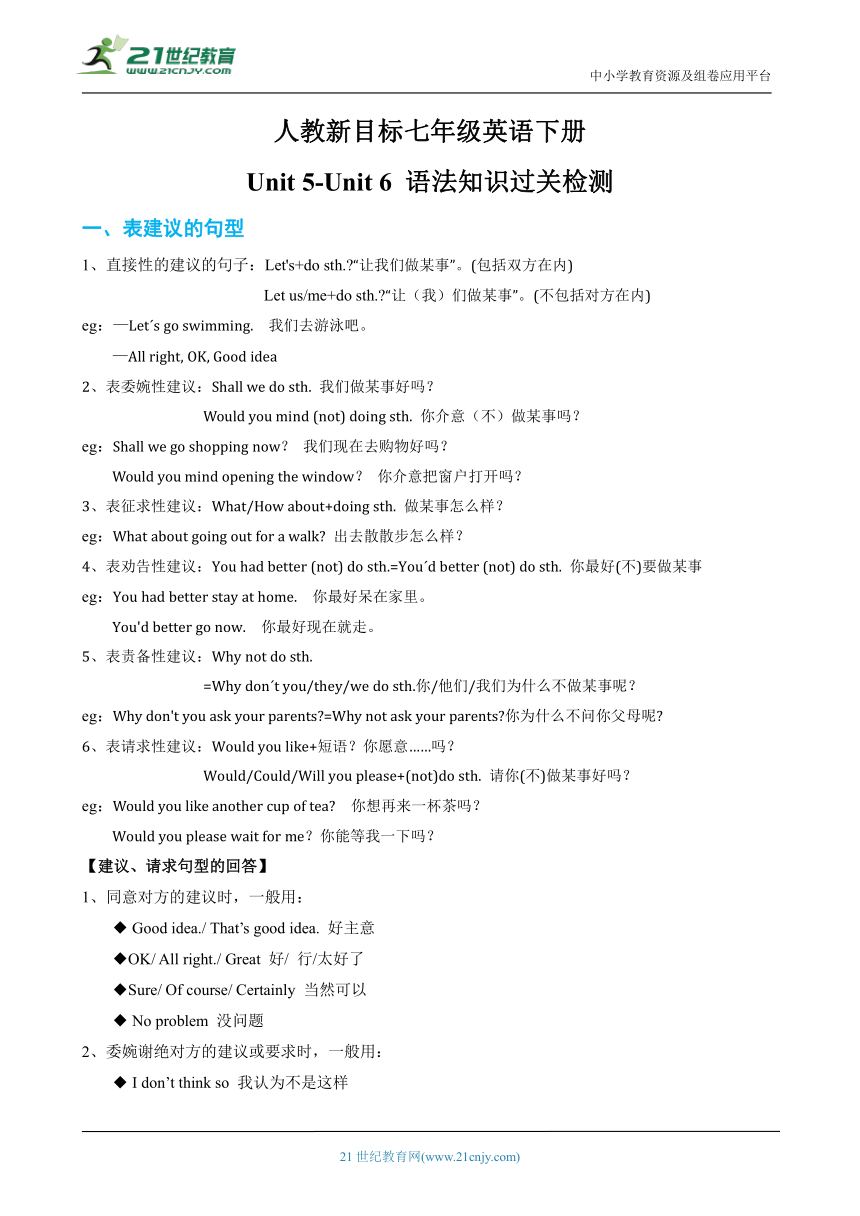 | |
| 格式 | docx | ||
| 文件大小 | 895.2KB | ||
| 资源类型 | 试卷 | ||
| 版本资源 | 人教新目标(Go for it)版 | ||
| 科目 | 英语 | ||
| 更新时间 | 2022-06-30 15:43:30 | ||
图片预览

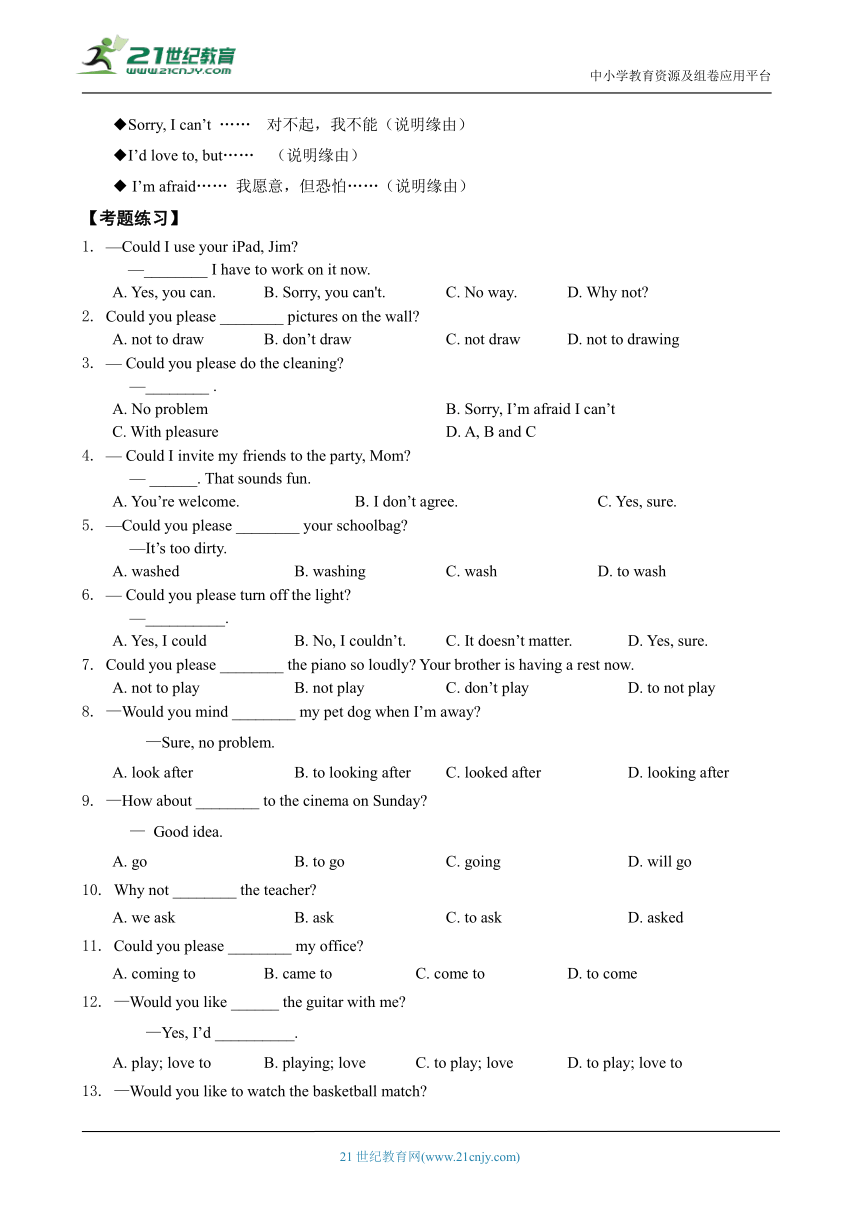
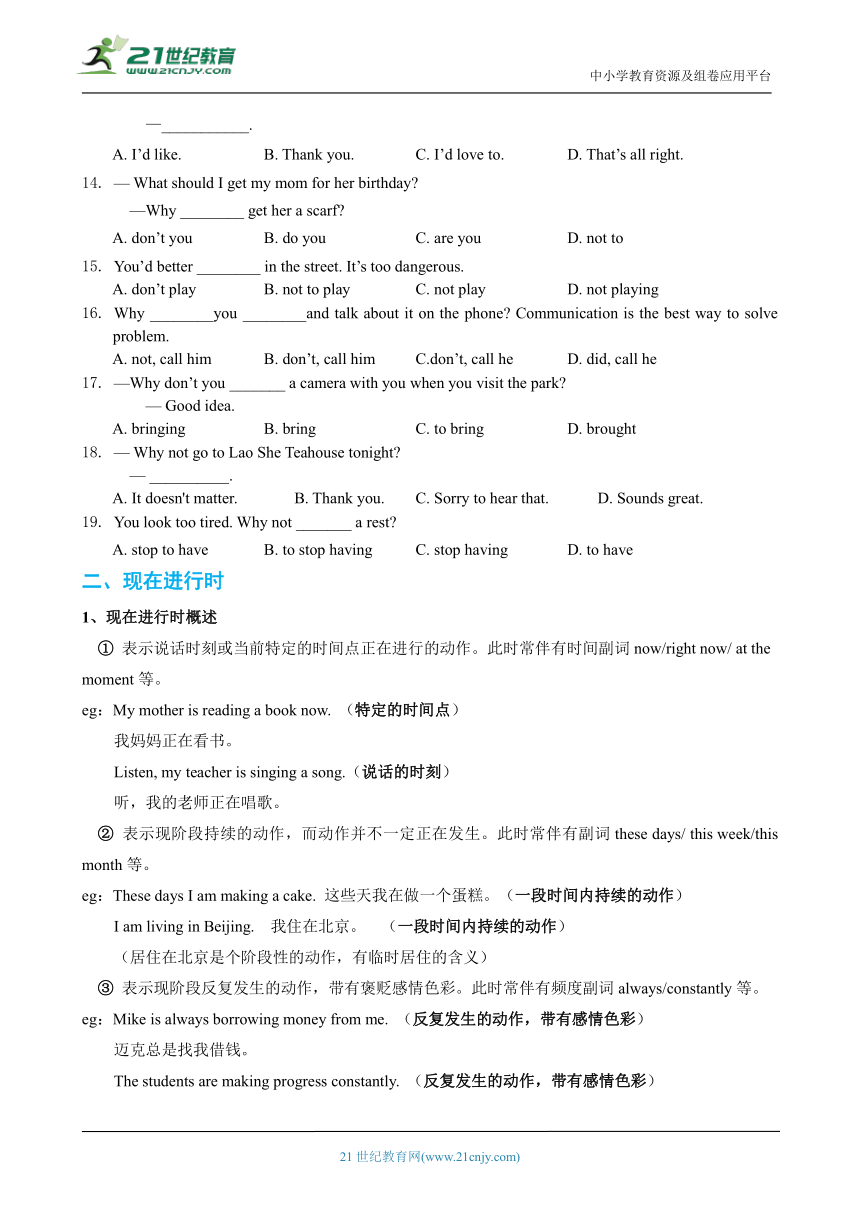
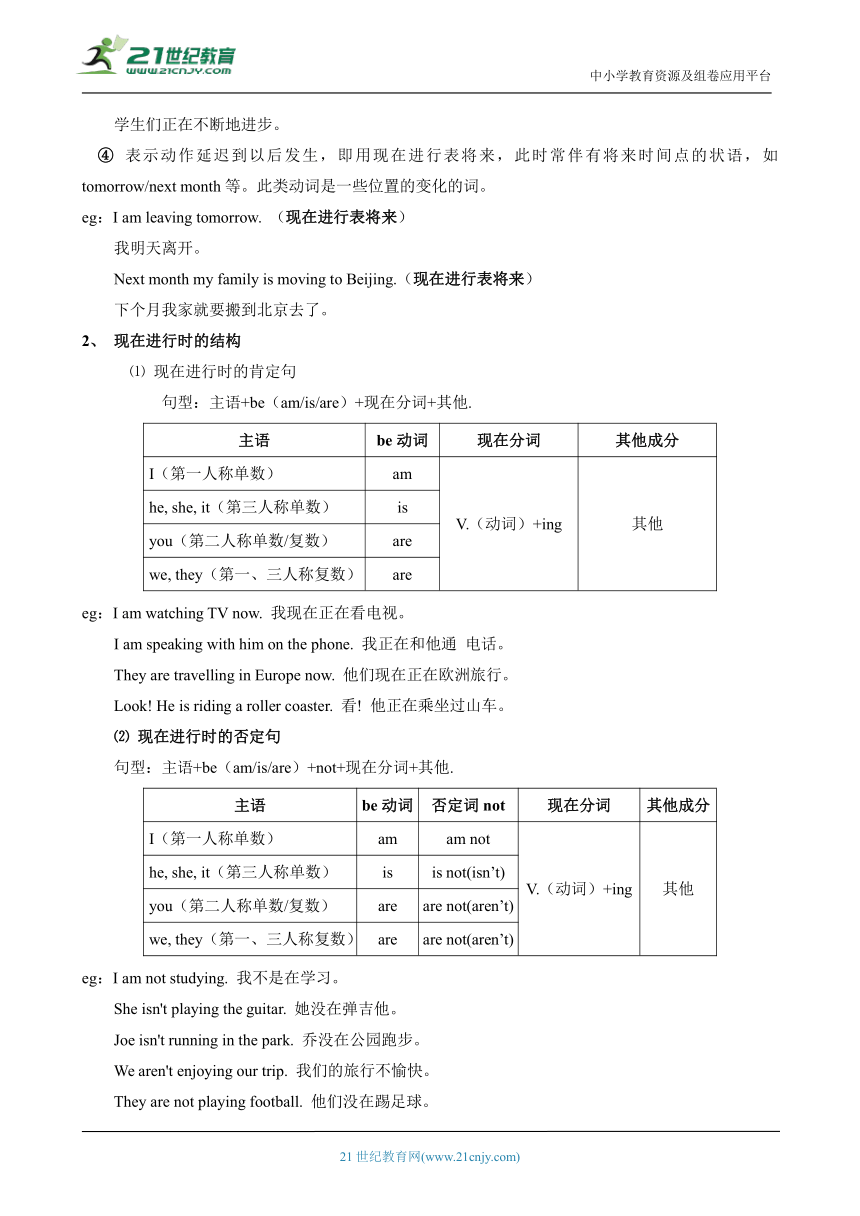
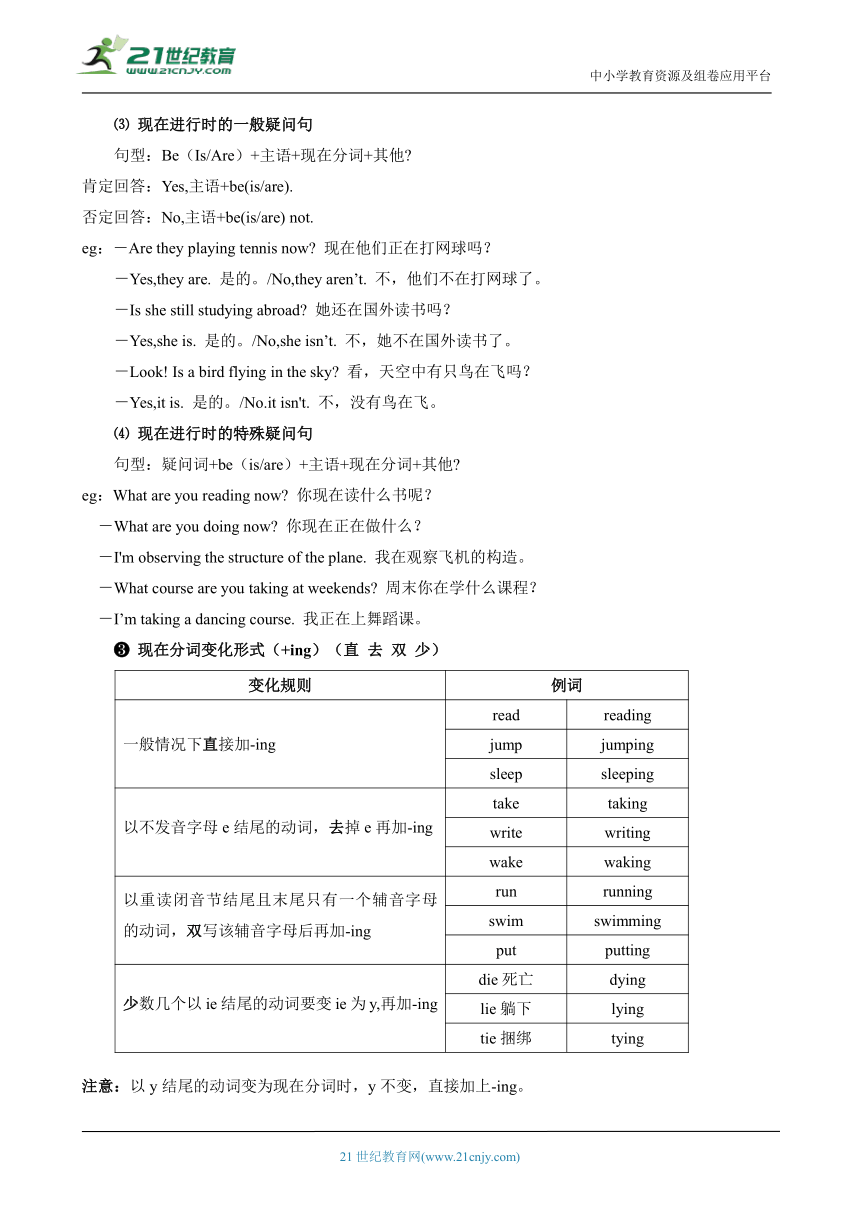
文档简介
中小学教育资源及组卷应用平台
人教新目标七年级英语下册
Unit 5-Unit 6 语法知识过关检测
一、表建议的句型
1、直接性的建议的句子:Let's+do sth. “让我们做某事”。(包括双方在内)
Let us/me+do sth. “让(我)们做某事”。(不包括对方在内)
eg:—Let s go swimming. 我们去游泳吧。
—All right, OK, Good idea
2、表委婉性建议:Shall we do sth. 我们做某事好吗?
Would you mind (not) doing sth. 你介意(不)做某事吗?
eg:Shall we go shopping now? 我们现在去购物好吗?
Would you mind opening the window? 你介意把窗户打开吗?
3、表征求性建议:What/How about+doing sth. 做某事怎么样?
eg:What about going out for a walk 出去散散步怎么样?
4、表劝告性建议:You had better (not) do sth.=You d better (not) do sth. 你最好(不)要做某事
eg:You had better stay at home. 你最好呆在家里。
You'd better go now. 你最好现在就走。
5、表责备性建议:Why not do sth.
=Why don t you/they/we do sth.你/他们/我们为什么不做某事呢?
eg:Why don't you ask your parents =Why not ask your parents 你为什么不问你父母呢
6、表请求性建议:Would you like+短语?你愿意……吗?
Would/Could/Will you please+(not)do sth. 请你(不)做某事好吗?
eg:Would you like another cup of tea 你想再来一杯茶吗?
Would you please wait for me?你能等我一下吗?
【建议、请求句型的回答】
1、同意对方的建议时,一般用:
◆ Good idea./ That’s good idea. 好主意
◆OK/ All right./ Great 好/ 行/太好了
◆Sure/ Of course/ Certainly 当然可以
◆ No problem 没问题
2、委婉谢绝对方的建议或要求时,一般用:
◆ I don’t think so 我认为不是这样
◆Sorry, I can’t …… 对不起,我不能(说明缘由)
◆I’d love to, but…… (说明缘由)
◆ I’m afraid…… 我愿意,但恐怕……(说明缘由)
【考题练习】
—Could I use your iPad, Jim
—________ I have to work on it now.
A. Yes, you can. B. Sorry, you can't. C. No way. D. Why not
Could you please ________ pictures on the wall
A. not to draw B. don’t draw C. not draw D. not to drawing
— Could you please do the cleaning
—________ .
A. No problem B. Sorry, I’m afraid I can’t
C. With pleasure D. A, B and C
— Could I invite my friends to the party, Mom
— ______. That sounds fun.
A. You’re welcome. B. I don’t agree. C. Yes, sure.
—Could you please ________ your schoolbag
—It’s too dirty.
A. washed B. washing C. wash D. to wash
— Could you please turn off the light
—__________.
A. Yes, I could B. No, I couldn’t. C. It doesn’t matter. D. Yes, sure.
Could you please ________ the piano so loudly Your brother is having a rest now.
A. not to play B. not play C. don’t play D. to not play
—Would you mind ________ my pet dog when I’m away
—Sure, no problem.
A. look after B. to looking after C. looked after D. looking after
—How about ________ to the cinema on Sunday
— Good idea.
A. go B. to go C. going D. will go
Why not ________ the teacher
A. we ask B. ask C. to ask D. asked
Could you please ________ my office
A. coming to B. came to C. come to D. to come
—Would you like ______ the guitar with me
—Yes, I’d __________.
A. play; love to B. playing; love C. to play; love D. to play; love to
—Would you like to watch the basketball match
—___________.
A. I’d like. B. Thank you. C. I’d love to. D. That’s all right.
— What should I get my mom for her birthday
—Why ________ get her a scarf
A. don’t you B. do you C. are you D. not to
You’d better ________ in the street. It’s too dangerous.
A. don’t play B. not to play C. not play D. not playing
Why ________you ________and talk about it on the phone Communication is the best way to solve problem.
A. not, call him B. don’t, call him C.don’t, call he D. did, call he
—Why don’t you _______ a camera with you when you visit the park
— Good idea.
A. bringing B. bring C. to bring D. brought
— Why not go to Lao She Teahouse tonight
— __________.
A. It doesn't matter. B. Thank you. C. Sorry to hear that. D. Sounds great.
You look too tired. Why not _______ a rest
A. stop to have B. to stop having C. stop having D. to have
二、现在进行时
1、现在进行时概述
① 表示说话时刻或当前特定的时间点正在进行的动作。此时常伴有时间副词now/right now/ at the moment等。
eg:My mother is reading a book now. (特定的时间点)
我妈妈正在看书。
Listen, my teacher is singing a song.(说话的时刻)
听,我的老师正在唱歌。
② 表示现阶段持续的动作,而动作并不一定正在发生。此时常伴有副词these days/ this week/this month等。
eg:These days I am making a cake. 这些天我在做一个蛋糕。(一段时间内持续的动作)
I am living in Beijing. 我住在北京。 (一段时间内持续的动作)
(居住在北京是个阶段性的动作,有临时居住的含义)
③ 表示现阶段反复发生的动作,带有褒贬感彩。此时常伴有频度副词always/constantly等。
eg:Mike is always borrowing money from me. (反复发生的动作,带有感彩)
迈克总是找我借钱。
The students are making progress constantly. (反复发生的动作,带有感彩)
学生们正在不断地进步。
④ 表示动作延迟到以后发生,即用现在进行表将来,此时常伴有将来时间点的状语,如tomorrow/next month等。此类动词是一些位置的变化的词。
eg:I am leaving tomorrow. (现在进行表将来)
我明天离开。
Next month my family is moving to Beijing.(现在进行表将来)
下个月我家就要搬到北京去了。
2、 现在进行时的结构
⑴ 现在进行时的肯定句
句型:主语+be(am/is/are)+现在分词+其他.
主语 be动词 现在分词 其他成分
I(第一人称单数) am V.(动词)+ing 其他
he, she, it(第三人称单数) is
you(第二人称单数/复数) are
we, they(第一、三人称复数) are
eg:I am watching TV now. 我现在正在看电视。
I am speaking with him on the phone. 我正在和他通 电话。
They are travelling in Europe now. 他们现在正在欧洲旅行。
Look! He is riding a roller coaster. 看! 他正在乘坐过山车。
⑵ 现在进行时的否定句
句型:主语+be(am/is/are)+not+现在分词+其他.
主语 be动词 否定词not 现在分词 其他成分
I(第一人称单数) am am not V.(动词)+ing 其他
he, she, it(第三人称单数) is is not(isn’t)
you(第二人称单数/复数) are are not(aren’t)
we, they(第一、三人称复数) are are not(aren’t)
eg:I am not studying. 我不是在学习。
She isn't playing the guitar. 她没在弹吉他。
Joe isn't running in the park. 乔没在公园跑步。
We aren't enjoying our trip. 我们的旅行不愉快。
They are not playing football. 他们没在踢足球。
⑶ 现在进行时的一般疑问句
句型:Be(Is/Are)+主语+现在分词+其他
肯定回答:Yes,主语+be(is/are).
否定回答:No,主语+be(is/are) not.
eg:-Are they playing tennis now 现在他们正在打网球吗?
-Yes,they are. 是的。/No,they aren’t. 不,他们不在打网球了。
-Is she still studying abroad 她还在国外读书吗?
-Yes,she is. 是的。/No,she isn’t. 不,她不在国外读书了。
-Look! Is a bird flying in the sky 看,天空中有只鸟在飞吗?
-Yes,it is. 是的。/No.it isn't. 不,没有鸟在飞。
⑷ 现在进行时的特殊疑问句
句型:疑问词+be(is/are)+主语+现在分词+其他
eg:What are you reading now 你现在读什么书呢?
-What are you doing now 你现在正在做什么?
-I'm observing the structure of the plane. 我在观察飞机的构造。
-What course are you taking at weekends 周末你在学什么课程?
-I’m taking a dancing course. 我正在上舞蹈课。
现在分词变化形式(+ing)(直 去 双 少)
变化规则 例词
一般情况下直接加-ing read reading
jump jumping
sleep sleeping
以不发音字母e结尾的动词,去掉e再加-ing take taking
write writing
wake waking
以重读闭音节结尾且末尾只有一个辅音字母的动词,双写该辅音字母后再加-ing run running
swim swimming
put putting
少数几个以ie结尾的动词要变ie为y,再加-ing die死亡 dying
lie躺下 lying
tie捆绑 tying
注意:以y结尾的动词变为现在分词时,y不变,直接加上-ing。
eg:play→playing study→studying fly→flying
现在进行时标志词
⑴ look!“看”,listen!“听”等,表示动作一定正在发生。
eg:Listen! She is singing next door. 听!她正在隔壁唱歌。
Look! The girl is dancing in the classroom. 看!那个女孩正在教室里跳舞。
⑵ now“现在”,at the moment“此时此刻”
eg:They are working now.他们正在工作。
They are playing football at the moment.他们此刻正在踢球。
⑶ at present (目前),this week(本周),these days (这几天)
eg:Which lesson are you studying this week 你们这周学哪一课了?
We are making model planes these days. (说话时不一定在做飞机模型)
这些天我们在做飞机模型。
【考题练习】
Ⅰ、写出下列动词的现在分词。
play__________ run___________ swim_________ make_________
go___________ like___________ write_________ stay__________
read__________ have__________ sing__________ dance_________
put___________ see___________ buy___________ love__________
live__________ take__________ come_________ get___________
stop__________ sit____________ begin_________ shop__________
lie___________ tie____________ study_________ watch_________
Ⅱ、用所给词的正确形式填空。
Mr. Zheng ________________ (read) a book now.
The rabbits ________________ (jump) now.
Look ! Tom and John ________________ (swim).
My brother ________________ (make) a kite in his room now.
Look! The bus ________________ (stop).
We ________________ (have) an English class now.
Listen! Someone ________________ (come).
They ________________ (catch) butterflies(蝴蝶) now.
Look! He ________________ (dive) now.
Tom ________________ (watch) TV in the dining room.
The doctors ________________ (get) off the bus.
It ________________ (eat) fish now.
My father ________________ (work) in the office now.
The teachers ________________ (run) now.
Listen! Some girls ________________ (sing)in the classroom .
What __________ you __________ (do) now
Look! They ________________ (have) an English lesson .
They ________________ (not,water) the flowers now.
Look! the girls ________________ (dance )in the classroom.
My mother ________________ (cook)some nice food now.
Ⅲ、句型转换。
The students are cleaning the classroom.(改一般疑问句,作肯定和否定回答)
_____________________________________________________________
They are doing housework.(改为一般疑问句,并作肯定和否定回答)
_____________________________________________________________
Tom is reading books in his study.(改为一般疑问句)
_____________________________________________________________
My mother is cooking some nice food now.(改一般疑问句并作肯定和否定回答)
_____________________________________________________________
I'm playing the football in the playground.(改为否定句)
_____________________________________________________________
The baby is listening to the music.(对划线部分提问)
_____________________________________________________________
The boys are visiting the history museum.(对划线部分提问)
_____________________________________________________________
The old man is sleeping right now.(对划线部分提问)
_____________________________________________________________
The children are listening to the teacher of English.(对划线部分提问)
_____________________________________________________________
The woman is making a cake in the kitchen.(改为否定句)
_____________________________________________________________
Ⅳ、改错题
The TV no is working.
What do the boys doing
She sending a message to Lucy.
Come on, the film is start.
Does Tom reading books in his study
You going to Chinese classes
Listen! Someone are coming.
My father does working in the office now.
三、be from 与 come from
be from意为“从……来,来自……”,其同意短语为come from
be from be为系动词,句式的变化是由be来完成的,而且be有人称和数的变化
come from come为实义动词,句式的变化须借助助动词do /does /did来完成,且谓语动词come受主语的影响
eg:I am from Beijing. 我来自北京。
He isn't from England. 他不是来自英国。
Is he from England 他来自英国吗?
Li Ming comes from Shandong. 李明来自山东。
They don't come from China. 他们不是来自中国。
Do they come from China 他们来自中国吗?
【考题练习】
吴亦凡来自山东。
Wu Yifan _________________ Shandong.
=Li Ming _________________ Shandong.
他们来自中国吗?
Do they _________________ China
四、forget的用法
forget动词,意为“忘记;遗忘”。forget的后面既可以接不定式(to do),也可以接动词的-ing形式,但是表达的意思不同。
forget to do sth. 表示“忘记要做某事”,事情还没有做。
forget doing sth. 表示“忘记曾经做过某事”,事情已经做过了。
eg:I’m sorry I forgot to return the library book.
对不起,我忘记归还图书馆的书了。(书没有还)
Mary often forgets to bring her pen. 玛丽经常忘记带她的钢笔。
He forgets turning the light off. 他忘记他已经关灯了。
He forgot going to Shanghai with his parents when he was five years old.
他忘记了五岁时曾跟父母去过上海。(五岁时去过上海,忘记了)
注意:接to do的动作时间发生在“谓语动词之后,是将来的事情”,一般都是单一动作。
接doing的动作时间发生在“以谓语动词为核心,向前后延伸,一般都是过去发生的动作一直持续的事情”,一般都是重复、持续的动作。
【考题练习】
-The light in the office is still on.
-Oh, I forgot _________.
A. turning it off B. turn it off
C. to turn it off D. having turned it off
Don't forget ____________ (turn) off the light when you leave.
他忘记他已经关了灯了。
He forgot ____________ the light off.
五、数词+years old 与 数词-year-old
“数词+years old”常用来表示年龄,意为“……岁”。
“数词-year-old”构成复合形容词,词与词之间用连字符连接,其中的year必须用单数,在句中常作定语。
eg:She is twelve years old. 她12岁了。
Lily is a 12-year-old girl. 丽丽是一个12岁的女孩儿。
Lily is a 12-years-old girl. 丽丽是一个12岁的女孩儿。(×)
【复合形容词】:复合形容词是指由两个或两个以上的单词组成,词与词之间用连字符连接,相当于一个复合形容词一般用在名词前作定语。注意:复合形容词中的每个名词只能用原形。
eg:The old man spent a two-month holiday with his family happily.
老人和他的家人愉快的度过了两个假期。
The Chinese Communist Party (中国共产党) has nearly 90-year history.
This is a twenty-meter-tall tree. 这棵树有二十米高。
A three-year-old girl looks after her disabled father. 一个三岁的小女孩照顾她残疾的父亲。
His father is a hard-working farmer. 他父亲是个勤劳的农民。
【考题练习】
There was ________ woman in the room.
A. a 80-year-old B. an 80-year-old
C. a 80-years-old D. an 80-years-old
Jill is _______ 8 year old girl.She usually wears ________ uniform at school.
A. a; a B. a; an C. an; an D. an; a
我弟弟今年16岁了。
My brother is _____________________ this year.
参 考 答 案
B C D
C C D
B D C
B C D
C A C
B B D
A play-playing run-running
swim-swimming make-making go-going
like-liking write-writing stay-staying
read-reading have-having sing-singing
dance-dancing put-putting see-seeing
buy-buying love-loving live-living
take-taking come-coming get-getting
stop-stopping sit-sitting begin-beginning
shop-shopping lie-lying tie-tying
study-studying watch-watching is reading
are jumping are swimming is making
is stopping are having is coming
are catching is diving is watching
are getting is eating is working
are running are singing are doing
are having aren’t watering aren’t dancing
is cooking
Are the students cleaning the classroom? Yes, they are/No, they aren’t
Are they doing housework Yes, they are/No, they aren’t
Is Tom reading books in his study
Is your mother cooking any nice food now Yes, She is/No, She isn’t
I'm not playing the football in the playground.
Who is listening to the music. What are the boys doing
When is the old man sleeping What are the children doing
The woman isn’t making a cake in the kitchen. The TV isn’t working.
What are the boys doing She is sending a message to Lucy.
Come on, the film is starting. Is Tom reading books in his study
You are going to Chinese classes Listen! Someone is coming.
My father is working in the office es from; is from
come from C to turn
turning B D
16 years old
21世纪教育网 www.21cnjy.com 精品试卷·第 2 页 (共 2 页)
21世纪教育网(www.21cnjy.com)
人教新目标七年级英语下册
Unit 5-Unit 6 语法知识过关检测
一、表建议的句型
1、直接性的建议的句子:Let's+do sth. “让我们做某事”。(包括双方在内)
Let us/me+do sth. “让(我)们做某事”。(不包括对方在内)
eg:—Let s go swimming. 我们去游泳吧。
—All right, OK, Good idea
2、表委婉性建议:Shall we do sth. 我们做某事好吗?
Would you mind (not) doing sth. 你介意(不)做某事吗?
eg:Shall we go shopping now? 我们现在去购物好吗?
Would you mind opening the window? 你介意把窗户打开吗?
3、表征求性建议:What/How about+doing sth. 做某事怎么样?
eg:What about going out for a walk 出去散散步怎么样?
4、表劝告性建议:You had better (not) do sth.=You d better (not) do sth. 你最好(不)要做某事
eg:You had better stay at home. 你最好呆在家里。
You'd better go now. 你最好现在就走。
5、表责备性建议:Why not do sth.
=Why don t you/they/we do sth.你/他们/我们为什么不做某事呢?
eg:Why don't you ask your parents =Why not ask your parents 你为什么不问你父母呢
6、表请求性建议:Would you like+短语?你愿意……吗?
Would/Could/Will you please+(not)do sth. 请你(不)做某事好吗?
eg:Would you like another cup of tea 你想再来一杯茶吗?
Would you please wait for me?你能等我一下吗?
【建议、请求句型的回答】
1、同意对方的建议时,一般用:
◆ Good idea./ That’s good idea. 好主意
◆OK/ All right./ Great 好/ 行/太好了
◆Sure/ Of course/ Certainly 当然可以
◆ No problem 没问题
2、委婉谢绝对方的建议或要求时,一般用:
◆ I don’t think so 我认为不是这样
◆Sorry, I can’t …… 对不起,我不能(说明缘由)
◆I’d love to, but…… (说明缘由)
◆ I’m afraid…… 我愿意,但恐怕……(说明缘由)
【考题练习】
—Could I use your iPad, Jim
—________ I have to work on it now.
A. Yes, you can. B. Sorry, you can't. C. No way. D. Why not
Could you please ________ pictures on the wall
A. not to draw B. don’t draw C. not draw D. not to drawing
— Could you please do the cleaning
—________ .
A. No problem B. Sorry, I’m afraid I can’t
C. With pleasure D. A, B and C
— Could I invite my friends to the party, Mom
— ______. That sounds fun.
A. You’re welcome. B. I don’t agree. C. Yes, sure.
—Could you please ________ your schoolbag
—It’s too dirty.
A. washed B. washing C. wash D. to wash
— Could you please turn off the light
—__________.
A. Yes, I could B. No, I couldn’t. C. It doesn’t matter. D. Yes, sure.
Could you please ________ the piano so loudly Your brother is having a rest now.
A. not to play B. not play C. don’t play D. to not play
—Would you mind ________ my pet dog when I’m away
—Sure, no problem.
A. look after B. to looking after C. looked after D. looking after
—How about ________ to the cinema on Sunday
— Good idea.
A. go B. to go C. going D. will go
Why not ________ the teacher
A. we ask B. ask C. to ask D. asked
Could you please ________ my office
A. coming to B. came to C. come to D. to come
—Would you like ______ the guitar with me
—Yes, I’d __________.
A. play; love to B. playing; love C. to play; love D. to play; love to
—Would you like to watch the basketball match
—___________.
A. I’d like. B. Thank you. C. I’d love to. D. That’s all right.
— What should I get my mom for her birthday
—Why ________ get her a scarf
A. don’t you B. do you C. are you D. not to
You’d better ________ in the street. It’s too dangerous.
A. don’t play B. not to play C. not play D. not playing
Why ________you ________and talk about it on the phone Communication is the best way to solve problem.
A. not, call him B. don’t, call him C.don’t, call he D. did, call he
—Why don’t you _______ a camera with you when you visit the park
— Good idea.
A. bringing B. bring C. to bring D. brought
— Why not go to Lao She Teahouse tonight
— __________.
A. It doesn't matter. B. Thank you. C. Sorry to hear that. D. Sounds great.
You look too tired. Why not _______ a rest
A. stop to have B. to stop having C. stop having D. to have
二、现在进行时
1、现在进行时概述
① 表示说话时刻或当前特定的时间点正在进行的动作。此时常伴有时间副词now/right now/ at the moment等。
eg:My mother is reading a book now. (特定的时间点)
我妈妈正在看书。
Listen, my teacher is singing a song.(说话的时刻)
听,我的老师正在唱歌。
② 表示现阶段持续的动作,而动作并不一定正在发生。此时常伴有副词these days/ this week/this month等。
eg:These days I am making a cake. 这些天我在做一个蛋糕。(一段时间内持续的动作)
I am living in Beijing. 我住在北京。 (一段时间内持续的动作)
(居住在北京是个阶段性的动作,有临时居住的含义)
③ 表示现阶段反复发生的动作,带有褒贬感彩。此时常伴有频度副词always/constantly等。
eg:Mike is always borrowing money from me. (反复发生的动作,带有感彩)
迈克总是找我借钱。
The students are making progress constantly. (反复发生的动作,带有感彩)
学生们正在不断地进步。
④ 表示动作延迟到以后发生,即用现在进行表将来,此时常伴有将来时间点的状语,如tomorrow/next month等。此类动词是一些位置的变化的词。
eg:I am leaving tomorrow. (现在进行表将来)
我明天离开。
Next month my family is moving to Beijing.(现在进行表将来)
下个月我家就要搬到北京去了。
2、 现在进行时的结构
⑴ 现在进行时的肯定句
句型:主语+be(am/is/are)+现在分词+其他.
主语 be动词 现在分词 其他成分
I(第一人称单数) am V.(动词)+ing 其他
he, she, it(第三人称单数) is
you(第二人称单数/复数) are
we, they(第一、三人称复数) are
eg:I am watching TV now. 我现在正在看电视。
I am speaking with him on the phone. 我正在和他通 电话。
They are travelling in Europe now. 他们现在正在欧洲旅行。
Look! He is riding a roller coaster. 看! 他正在乘坐过山车。
⑵ 现在进行时的否定句
句型:主语+be(am/is/are)+not+现在分词+其他.
主语 be动词 否定词not 现在分词 其他成分
I(第一人称单数) am am not V.(动词)+ing 其他
he, she, it(第三人称单数) is is not(isn’t)
you(第二人称单数/复数) are are not(aren’t)
we, they(第一、三人称复数) are are not(aren’t)
eg:I am not studying. 我不是在学习。
She isn't playing the guitar. 她没在弹吉他。
Joe isn't running in the park. 乔没在公园跑步。
We aren't enjoying our trip. 我们的旅行不愉快。
They are not playing football. 他们没在踢足球。
⑶ 现在进行时的一般疑问句
句型:Be(Is/Are)+主语+现在分词+其他
肯定回答:Yes,主语+be(is/are).
否定回答:No,主语+be(is/are) not.
eg:-Are they playing tennis now 现在他们正在打网球吗?
-Yes,they are. 是的。/No,they aren’t. 不,他们不在打网球了。
-Is she still studying abroad 她还在国外读书吗?
-Yes,she is. 是的。/No,she isn’t. 不,她不在国外读书了。
-Look! Is a bird flying in the sky 看,天空中有只鸟在飞吗?
-Yes,it is. 是的。/No.it isn't. 不,没有鸟在飞。
⑷ 现在进行时的特殊疑问句
句型:疑问词+be(is/are)+主语+现在分词+其他
eg:What are you reading now 你现在读什么书呢?
-What are you doing now 你现在正在做什么?
-I'm observing the structure of the plane. 我在观察飞机的构造。
-What course are you taking at weekends 周末你在学什么课程?
-I’m taking a dancing course. 我正在上舞蹈课。
现在分词变化形式(+ing)(直 去 双 少)
变化规则 例词
一般情况下直接加-ing read reading
jump jumping
sleep sleeping
以不发音字母e结尾的动词,去掉e再加-ing take taking
write writing
wake waking
以重读闭音节结尾且末尾只有一个辅音字母的动词,双写该辅音字母后再加-ing run running
swim swimming
put putting
少数几个以ie结尾的动词要变ie为y,再加-ing die死亡 dying
lie躺下 lying
tie捆绑 tying
注意:以y结尾的动词变为现在分词时,y不变,直接加上-ing。
eg:play→playing study→studying fly→flying
现在进行时标志词
⑴ look!“看”,listen!“听”等,表示动作一定正在发生。
eg:Listen! She is singing next door. 听!她正在隔壁唱歌。
Look! The girl is dancing in the classroom. 看!那个女孩正在教室里跳舞。
⑵ now“现在”,at the moment“此时此刻”
eg:They are working now.他们正在工作。
They are playing football at the moment.他们此刻正在踢球。
⑶ at present (目前),this week(本周),these days (这几天)
eg:Which lesson are you studying this week 你们这周学哪一课了?
We are making model planes these days. (说话时不一定在做飞机模型)
这些天我们在做飞机模型。
【考题练习】
Ⅰ、写出下列动词的现在分词。
play__________ run___________ swim_________ make_________
go___________ like___________ write_________ stay__________
read__________ have__________ sing__________ dance_________
put___________ see___________ buy___________ love__________
live__________ take__________ come_________ get___________
stop__________ sit____________ begin_________ shop__________
lie___________ tie____________ study_________ watch_________
Ⅱ、用所给词的正确形式填空。
Mr. Zheng ________________ (read) a book now.
The rabbits ________________ (jump) now.
Look ! Tom and John ________________ (swim).
My brother ________________ (make) a kite in his room now.
Look! The bus ________________ (stop).
We ________________ (have) an English class now.
Listen! Someone ________________ (come).
They ________________ (catch) butterflies(蝴蝶) now.
Look! He ________________ (dive) now.
Tom ________________ (watch) TV in the dining room.
The doctors ________________ (get) off the bus.
It ________________ (eat) fish now.
My father ________________ (work) in the office now.
The teachers ________________ (run) now.
Listen! Some girls ________________ (sing)in the classroom .
What __________ you __________ (do) now
Look! They ________________ (have) an English lesson .
They ________________ (not,water) the flowers now.
Look! the girls ________________ (dance )in the classroom.
My mother ________________ (cook)some nice food now.
Ⅲ、句型转换。
The students are cleaning the classroom.(改一般疑问句,作肯定和否定回答)
_____________________________________________________________
They are doing housework.(改为一般疑问句,并作肯定和否定回答)
_____________________________________________________________
Tom is reading books in his study.(改为一般疑问句)
_____________________________________________________________
My mother is cooking some nice food now.(改一般疑问句并作肯定和否定回答)
_____________________________________________________________
I'm playing the football in the playground.(改为否定句)
_____________________________________________________________
The baby is listening to the music.(对划线部分提问)
_____________________________________________________________
The boys are visiting the history museum.(对划线部分提问)
_____________________________________________________________
The old man is sleeping right now.(对划线部分提问)
_____________________________________________________________
The children are listening to the teacher of English.(对划线部分提问)
_____________________________________________________________
The woman is making a cake in the kitchen.(改为否定句)
_____________________________________________________________
Ⅳ、改错题
The TV no is working.
What do the boys doing
She sending a message to Lucy.
Come on, the film is start.
Does Tom reading books in his study
You going to Chinese classes
Listen! Someone are coming.
My father does working in the office now.
三、be from 与 come from
be from意为“从……来,来自……”,其同意短语为come from
be from be为系动词,句式的变化是由be来完成的,而且be有人称和数的变化
come from come为实义动词,句式的变化须借助助动词do /does /did来完成,且谓语动词come受主语的影响
eg:I am from Beijing. 我来自北京。
He isn't from England. 他不是来自英国。
Is he from England 他来自英国吗?
Li Ming comes from Shandong. 李明来自山东。
They don't come from China. 他们不是来自中国。
Do they come from China 他们来自中国吗?
【考题练习】
吴亦凡来自山东。
Wu Yifan _________________ Shandong.
=Li Ming _________________ Shandong.
他们来自中国吗?
Do they _________________ China
四、forget的用法
forget动词,意为“忘记;遗忘”。forget的后面既可以接不定式(to do),也可以接动词的-ing形式,但是表达的意思不同。
forget to do sth. 表示“忘记要做某事”,事情还没有做。
forget doing sth. 表示“忘记曾经做过某事”,事情已经做过了。
eg:I’m sorry I forgot to return the library book.
对不起,我忘记归还图书馆的书了。(书没有还)
Mary often forgets to bring her pen. 玛丽经常忘记带她的钢笔。
He forgets turning the light off. 他忘记他已经关灯了。
He forgot going to Shanghai with his parents when he was five years old.
他忘记了五岁时曾跟父母去过上海。(五岁时去过上海,忘记了)
注意:接to do的动作时间发生在“谓语动词之后,是将来的事情”,一般都是单一动作。
接doing的动作时间发生在“以谓语动词为核心,向前后延伸,一般都是过去发生的动作一直持续的事情”,一般都是重复、持续的动作。
【考题练习】
-The light in the office is still on.
-Oh, I forgot _________.
A. turning it off B. turn it off
C. to turn it off D. having turned it off
Don't forget ____________ (turn) off the light when you leave.
他忘记他已经关了灯了。
He forgot ____________ the light off.
五、数词+years old 与 数词-year-old
“数词+years old”常用来表示年龄,意为“……岁”。
“数词-year-old”构成复合形容词,词与词之间用连字符连接,其中的year必须用单数,在句中常作定语。
eg:She is twelve years old. 她12岁了。
Lily is a 12-year-old girl. 丽丽是一个12岁的女孩儿。
Lily is a 12-years-old girl. 丽丽是一个12岁的女孩儿。(×)
【复合形容词】:复合形容词是指由两个或两个以上的单词组成,词与词之间用连字符连接,相当于一个复合形容词一般用在名词前作定语。注意:复合形容词中的每个名词只能用原形。
eg:The old man spent a two-month holiday with his family happily.
老人和他的家人愉快的度过了两个假期。
The Chinese Communist Party (中国共产党) has nearly 90-year history.
This is a twenty-meter-tall tree. 这棵树有二十米高。
A three-year-old girl looks after her disabled father. 一个三岁的小女孩照顾她残疾的父亲。
His father is a hard-working farmer. 他父亲是个勤劳的农民。
【考题练习】
There was ________ woman in the room.
A. a 80-year-old B. an 80-year-old
C. a 80-years-old D. an 80-years-old
Jill is _______ 8 year old girl.She usually wears ________ uniform at school.
A. a; a B. a; an C. an; an D. an; a
我弟弟今年16岁了。
My brother is _____________________ this year.
参 考 答 案
B C D
C C D
B D C
B C D
C A C
B B D
A play-playing run-running
swim-swimming make-making go-going
like-liking write-writing stay-staying
read-reading have-having sing-singing
dance-dancing put-putting see-seeing
buy-buying love-loving live-living
take-taking come-coming get-getting
stop-stopping sit-sitting begin-beginning
shop-shopping lie-lying tie-tying
study-studying watch-watching is reading
are jumping are swimming is making
is stopping are having is coming
are catching is diving is watching
are getting is eating is working
are running are singing are doing
are having aren’t watering aren’t dancing
is cooking
Are the students cleaning the classroom? Yes, they are/No, they aren’t
Are they doing housework Yes, they are/No, they aren’t
Is Tom reading books in his study
Is your mother cooking any nice food now Yes, She is/No, She isn’t
I'm not playing the football in the playground.
Who is listening to the music. What are the boys doing
When is the old man sleeping What are the children doing
The woman isn’t making a cake in the kitchen. The TV isn’t working.
What are the boys doing She is sending a message to Lucy.
Come on, the film is starting. Is Tom reading books in his study
You are going to Chinese classes Listen! Someone is coming.
My father is working in the office es from; is from
come from C to turn
turning B D
16 years old
21世纪教育网 www.21cnjy.com 精品试卷·第 2 页 (共 2 页)
21世纪教育网(www.21cnjy.com)
同课章节目录
